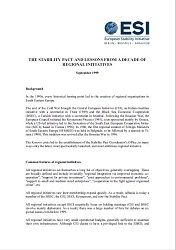MONTENEGRO: A Balancing Act
MONTENEGRO: A Balancing Act
Author(s): Kimberly Bender, Kristof Bender
Subject(s): Security and defense, Post-Communist Transformation, Wars in Jugoslavia
Published by: ESI – European Stability Initiative
Keywords: Montenegro Security 1999;
Summary/Abstract: The Interior Ministry appears confident that it can keep the situation in Montenegro under control for the time being despite the organising of demonstrations, local council gatherings and parallel security forces by Milosevic-supporters in Serb-dominated areas in the North.The government's confident security assessment is based on three main factors: (i) the fact that Milosevic did not use the opportunity of the Kosovo crisis to attack the Montenegrin government, (ii) expectations for Western assistance as symbolised by nearby KFOR and SFOR troops, and (iii) an assessment that the Yugoslav Army is internally divided.The most pressing issue for the government is coping with the attempts at economic destabilisation from Belgrade at a time when Western assistance remains scarce. If the main obstacle for becoming a recipient of Western assistance is seen to be belonging to a joint state with Serbia, there will be increasing calls for separation.The government has not spoken openly about the possibility of moving towards independence and has indicated its willingness to bide its time for a few more months within the present Federal arrangement with Serbia but will then be forced to hold a referendum on Montenegro's status.International actors and donors must use this time to show concrete support for Montenegro and offer it a perspective of trade preferences. Ways of providing soft security guarantees through an increased international presence must also be explored.
Series: ESI Discussion Papers
- Page Count: 6
- Publication Year: 1999
- Language: English
- Content File-PDF

